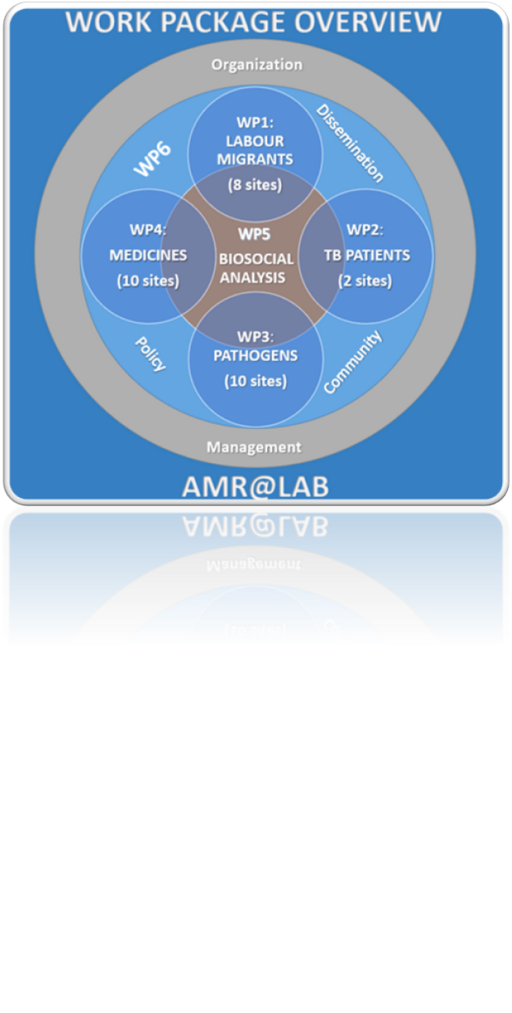
WP1: Anthropological study among labour migrants in eight sites
This WP is an anthropological study will focus on health, living conditions and migration trajectories of labour migrants across the following industries, covering seasonal and environmental variation. Field work will be conducted in 2 phases by 4 postdoctoral fellows (PD), each covering one site in each phase, which consists of 6 months data collection and 6 months data entry and analysis. With a main emphasis on medical and migrant anthropology, methods include ethnographic fieldwork and mapping of social networks and healthcare services. Expecting a depletion rate of 20%, 125 workers will be included in a survey, which covers health, living conditions, migration trajectories and impact of the coronavirus pandemic. A sub-group of 25 participants will take part in repeated ethnographic interviewing during a two months’ period to develop in-depth knowledge on life conditions, migration trajectories and social relations.
WP2: Anthropological study of TB patients in two sites
WP2 is a combined anthropological and microbiological TB study conducted at the clinics of BPKIHS and VPCI, respectively. This has been designed as a separate WP to address the problem of an expected insufficient number of TB cases among migrant workers in the WP1 field sites. Whereas the project uses the same ethnographic data collection methods as in WP1, they will be tailormade to fit the TB context, and observation of workplace activities will be replaced by clinical observations.
WP3: Microbiological study of AMR in 10 sites
Stool samples will be obtained from 1000 survey participants and will be transported to nearest qualified lab or BPKIHS or VPCI, if within reach. In Nepal, except for sites within reach of BPKIHS, standard laboratory analysis will be outsourced. In India, the closest NABL-accredited laboratory will be used as geographical distance makes timely transport to VPCI impossible. In each country, a team of postdoctoral fellows and research assistants will be trained to obtain, handle and transport stool samples under the supervision of the principal investigators, visiting one site at the time and transporting samples to the identified laboratory daily. A detailed step-by-step instruction for the exact methods to be followed has been developed to ensure uniformity across laboratories.
WP4: Medicines
This WP incorporates pharmacological expertise in the analysis of data from WP1+2 regarding health seeking practices and consumption of medicines including antibiotics. This analysis establishes individual risk of development of AMR among 1000 participants as well as patterns of exposure to risk across local healthcare systems across all sites. Whereas the degree of appropriate use of antibiotics in the AMR contagion arm is indirectly assessed, the AMR infection arm allows us to relate data to established diagnoses. Medicine and test consumption and healthcare expenditures will be linked to the mapping of healthcare providers used by participants to establish patterns of treatment practices by type of provider. This allows for providers and medicines to be treated as nodes in the biosocial network analysis.
WP5 Synergy - Biosocial networks
This WP creates analytical synergy across WP1-4. Building on biosocial theory, this WP attempts to go beyond state of the art in integrating medical, biological and social science through multi-scalar network analysis. Inspired by Science and Technology Studies (STS), the project will develop layered networks, where the following will be considered as network nodes in a biosocial AMR network: migrant workers (including TB patients); workplaces; treatment providers; selected pathogens; antimicrobials. Potential clustering of AMR dense network patterns will be checked against relevant factors identified in the ethnographic study.
WP 6: Dissemination
The methodology, design and research questions described above have been informed by online community stakeholder consultations (CSC) conducted in June 2021 in both countries, including representatives of NGOs working with migrants and/or health; trade unions; employer organisations; activists, local WHO officers, journalists and relevant local research institutions. The CSCs formed the basis of a report for each country and informed the present application. Participants welcomed the research initiative and pointed to critical barriers to access that are incorporated into the research instruments, e.g. questionnaire, and pointed to the need for educational output. The participants will be invited to community stakeholder workshops (CSW) in each country for discussion of preliminary findings and possible policy recommendations at relevant later stages of the project.